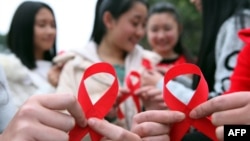As World AIDS Day approaches Dec. 1, new research is offering hope for further treatment options and, perhaps, even a vaccine.
When the first World AIDS Day was held in 1988, infection was a death sentence. Today, there is lifesaving treatment. In Thailand, researchers eliminated mother-to-child HIV transmission, the first country in Asia to do so. In South Africa, a major clinical trial of an experimental AIDS vaccine aims to reduce the risk of HIV infection by 50 percent.
In the United States, researchers are working to use the body's own immune system to keep the virus in check.
One study conducted by the University of Pennsylvania shows promise.
"We infuse antibodies into the patients, the participants in the study, and we want to see if those antibodies will control the HIV virus … keep it quiet, and prevent the virus from coming back when we stop anti-retroviral therapy," said Dr. Pablo Tebas, an infectious disease specialist.
Tebas said the research in controlling HIV with antibodies is similar to immunotherapy being done in the field of cancer. HIV, he explains, hides in cells. If a patient stops taking anti-AIDS drugs, the virus comes back. The new technique aims to work as cancer therapy works, where antibodies are used to attack cancer cells.
"When you think about oncology and cancer therapy with these immune-based therapies, what people are doing now in that field is to try to boost the immune system to eliminate the cancer cells,” he said. “The problem of eliminating the HIV hideout is similar. You want to eliminate the cells that harbor the virus and, by making the immune system more active, in finding and eliminating those cells."
Researchers have found that the antibodies suppressed the HIV virus for 21 days. The goal is to find a combination of antibodies that can suppress the virus for six months to a year.
A new trial using two antibodies is to start in the next couple of months.
